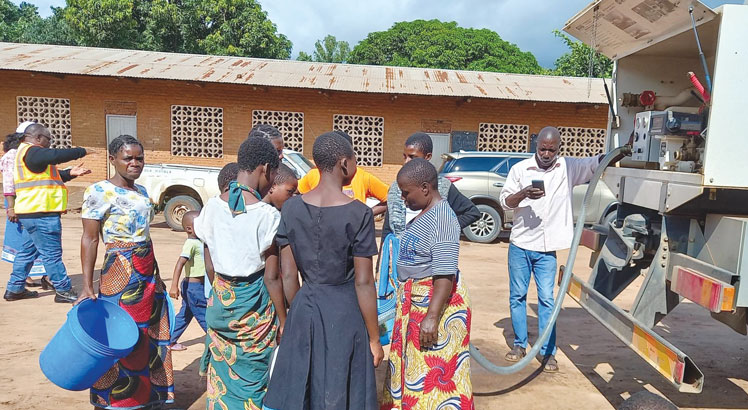The power of huge volumes of water should never be underestimated. A little water in a bottle or a cup or even in a bucket can be benign as it will easily be under your control. But when a huge body of water meets some resistance as it attempts to go somewhere, it can get out of control and can cause extensive damage.
It was a dark week last week with cyclone Freddy wreaking havoc in many parts of the southern region, not least in the city of Blantyre. A clip taken from some unnamed river made rounds on the social media platforms. It showed a young man trying to cross a swelled up river, in defiance of the advice of friends. When he was some distance into the river he was visibly overwhelmed by the water, whereupon a well-wisher quickly got into the river to rescue him. As the well-wisher pulled the “victim” to land, he gave him a number of slaps to teach him a lesson. Playing with gathered water is silly.
A friend of mine runs an executive lodge within the city of Blantyre. In the afternoon of Monday water gathered in the quarters of one of the neighbours. The two properties are separated by a brick fence. Trying to get somewhere, the water knocked down the brick fence and swamped my friend’s yard in a matter of minutes. It proceeded to knock down the front wall of the fence on its way out of the premises. All this happened “in the twinkling of an eye.” Water can cause untold devastation within a very short space of time.
Malawi has experienced flash floods throughout its history. What is perhaps still fresh in people’s minds is the incident of flash floods in Zomba in 1946. The local name for flash flood is napolo. The story of the 1946 napolo is part of Southern Malawi’s modern oral tradition. It has been narrated in a number of forms, not excluding musically. In 1948, the Paseli Brothers Band recorded a hit titled Napolo, in which they described the Zomba flood. Recorded in Salisbury, Southern Rhodesia, the hit took British Central Africa by the storm.
The flooding occurred in December of 1946 following incessant rains which yielded 711mm of rainfall in just 36 hours. They did not have cyclone names then, so it is difficult to say which cyclone caused this heavy downpour. 254mm of the 711mm were recorded within one hour. This was a giant of a storm, in which landslides and mud flows swallowed up villages. According to reports by some British people, 21 “Africans” lost their lives.
In 1991, a massive n a p o l o oc cur r ed in Phalombe. On March 10 of that year, Michesi Mountain unleashed sudden terror as masses of water erupted from the mountain and gushed downhi l l , sweeping everything in the water’s path. An avalanche of rocks, tree branches and other hard objects completed the damage that the water had caused. Bokosi, Mwazule and Opeliwa Villages were thoroughly pulverized by this unkind occurrence of nature. It has been estimated that between 700 and 1000 people lost their lives. The then President of the Republic of Malawi, Dr. Hastings Kamuzu Banda, visited the scene by helicopter. Kamuzu wept.
A multiplicity of napolos visited us again in the week gone by, courtesy of Cyclone Freddy. Soche, Ndirande, Mpingwe and Chambe Mountains were centres of flash floods that caused devastation downhill. The media reported a death toll of 326, as at the time of writing this article. That figure may have gone higher since.
A young man who used to work for a security company and was regularly deployed to our home as a guard developed a cordial relationship with us. He left his employment and set himself up as bricklayer. Just last month I used him to reconstruct part of the wall around our house, which had collapsed. He was staying at Chilobwe. On Monday last week, we got a report to the effect that he was missing. A day later we learnt that his body, and that of his daughter, had been recovered by the rescuers. What a painful way to depart!
I have both good and bad news for my readers. The bad news first: cyclones will not disappear any time soon. They will increase in frequency and intensity in the coming years. The good news is that we shall have learnt our lessons from the previous storms. The first lesson is that we should avoid building in valleys at all costs. Napolo happens in a flash and the water will devastate anything in its natural path. Secondly, never underestimate moving water. Finally, plant trees
The post The infamous napolo occurrences first appeared on The Nation Online.
 Moni Malawi
Moni Malawi 
